Welcome. This is my library. A collection of both my notes on spiritual subjects (with sources) and links to good sources, that deserve to be mentioned.
Don't wanna be here? Send us removal request.
Text
Book Review - A Mystical Practical Guide to Magic by Aliza Einhorn
Rating: ⭐⭐⭐ (3.0)
Would Buy? No
Theme: astrology, tarot, meditation, past lives, rituals, spirit work, beginner

Overall
Interesting and fun to read, but doesn't feel like something I would buy, since I'd buy rather something that has more information in it. This is rather to get you curious about these topics rather than give you even the base for further research. The only topic she actually gave some basic information about is Moon Pluto Magic, which is a path she named herself. Also gives many spells and also some ways to contact spirits, but doesn't talk about any spiritual safety, as she seemingly does not believe that any malicious spirits exist. However, she provides many book recommendations, so that's good.
Pros
I like the tarot chapter quite a lot. The fact she talks about how you can study one card for ages and always find something new. Also how she recommends to keep track of which cards are repeatedly showing up, and which have not shown up in a while. Also, she does mention tarot in almost every section, showing how divination can be used pretty much in anything and how you can combine different paths.
Astrology is also quite well written, as she does have the most experience in these two topics. She also recommends to study each sign, planet and house seperately as well, so that we can understand better how to combine them (and encourages looking up specific positions online at the same time).
It is really good that she reminds us that things like mercury retrograde are often exaggerated online, or at least it can seem scary to newbies, but it's not the end of the world, and is just a bit of an obstacle, which life has quite a lot of.
Wonderful that she recommends Astrodienst and doesn't even mention Co-Star
Reminds about candle safety
Talking about the possibility of having a mental altar instead of a physical one.
It is wonderful to see her talk about mundane things in such a magical way.
Cons
I don't exactly agree that astrology has to be 100% the best way to know yourself, especially when people often believe in different astrological systems.
I hate to say this, but many of the metaphors sound forced. Like when using Major Arcana cards for astrology learning, she seemed to have an idea of a few that fit, and then had the need to fill the cards in between with something.
She contradicts herself with her spirit beliefs. She says that she calls every non-physical entity spirit guides. Then she says that spirit guides do just that - they guide us, that is their purpose. So she believes there are no other entities that don't guide us? But she also said at first that there are bad spirits out there. And later on she says that she doesn't believe that when you're trying to contact someone, that a malicious spirit might respond instead, and when she talks about some people having different believes, she ends up sounding slightly condescending and it feels like she thinks those people are just paranoid (not about who can answer, but the existence of malicious spirits in general). So any spiritual safety went out the window.
I have a huge feeling that this sounds like she condones cultural appropriation (not the bit about Santa Muerte, but the talks after, I include Santa Muerte only because that's what it started with): "in today's world there is much talk about cultural appropriation... ...I wasn't looking to take anything from anyone" (talking about Santa Muerte), "you can't decide whom you fall in love with, but you can decide what to do with it... I want to encourage you not to push away your spiritual desire, no matter how you were raised or who would or wouldn't approve" If she herself didn't start with talks of cultural appropriation, it probably wouldn't even come off that way, but this all was in that context.
Misc.
love how she says that tarot can bring both clarity and confusion
her talking about natal chart is really beautiful - that it is as if fate took a stop and took a picture of the sky, which is you.
quite an interesting thought to do weekly tarot readings on the day which is made of the sum of the digits in your birth date.
It was very interesting to read about the role of emotions in magic.
The writing suggestions are really interesting, though it sometimes looks like she says that writing is the only way to progress.
A little bit saddening that the overly positively sounding book ended on a grim note of quarantine and whether we will survive it, but that's not a con, just something that I thought of when reading it.
Img src.: Goodreads
0 notes
Text
Book Review - By Rust of Nail and Prick of Thorn by Althaea Sebastiani
Rating: ⭐⭐⭐⭐⭐ (4.75)
Would Buy? Yes
Theme: protection

Overall
Wonderful book, I would say that even though she talks about how you shouldn’t be exactly a beginner to read it, beginners would also benefit from reading this. Even if they may have trouble creating some more powerful / effective ones right off the bat, it is good for practice (which she also mentions). And it gives you a better understanding as to why spiritual protection is important.
As for more advanced readers, I would say it is also an excellent read, as you might find more methods you have never thought of, or perhaps even extra things to ward against that you haven’t thought of.
Pros
Very good explanation of what we ward against and what wards are.
Lots of different methods to try.
Explanation of why you are most likely not gonna get cursed, even though it is one of the things we like to preventively ward against.
Great talk about not making excuses and taking shortcuts to be lazy.
Wonderful that she notes down how physical place of the space (i.e. near crossroads, busy streets, bad neighbours) can increase the need for wards and also change where and against what we put the wards.
Cons
talks about “locking the place down too tightly” - what is too tightly? How do you know?
emergency warding sometimes just weird - like in sigils, where is ways to use sigils and then emergency warding - the methods seem pretty much the same. What makes it good for an emergency?
Warding every electrical outlet, every little hole? Cables? She does say later on that it is excessive, however even when you are in active danger of something big, what makes an electrical outlet any more vulnerable than walls?
Misc.
Some of the advice may be useless unless you’re an animist (i.e. asking the stones about its uses). That isn’t a bad thing as there are many other methods, but I also think it’s not exactly great to rely only on what the stone tells you, especially when it might go completely against its properties. We might be getting the meanings wrong and then just use it for something it’s not good at at all.
I don’t think having a general ward is necessarily a bad thing, as long as you incorporate some specific ones as well. Which brings up another thing - missed a chance to talk about having a general ward into which more specific wards are made.
img src: Goodreads
2 notes
·
View notes
Text
So You've Been Contacted By a Closed Entity
...supposedly.

Believing a closed deity or entity has "reached out" to you is not an excuse; if they were closed to you before, they still are.
But you can't speak on their behalf or control them!
Correct, good thing that's not what we're doing here. People calling out this kind of thing out aren't concerned about the deity, they're concerned about the people. The issue at hand is how offensive, disrespectful, or even actively harmful the cultural appropriation would be.
Also, sometimes depending on the tradition you actually CAN, more or less.
But THEY reached out to ME!
For starters, there's a good chance they actually didn't. Many closed figures are criminaly misrepresented in mainstream culture, so it's possible you're diagnosing off of a bastardized stereotype rather than genuine sources. Sometimes stuff can only be diagnosed by certain members of that culture, meaning you'd need to go through the proper channels anyway to even confirm stuff. Besides, what could they want with somebody who has no cultural connection or understanding of them?
As for that dream you had, not every dream (even vivid ones) needs to be taken literally. Once I vividly dreamed I was cop, that doesn't mean it was a sign from the Universe to start licking boots.
But what if they really DID reach out? What do I do?
Who says you have to do anything? You don't have to accept every invitation/request you receive. Remember- we can't ever prove deities exist, but we can prove other human beings exist. We always like to condemn using one's faith to harm others, and that includes putting your personal wants over the voices of marginalized people.
I really think it needs addressing, though!
Find a trusted, reliable member of that tradition to speak with. In some cases, they might be able to help you diagnose things properly navigate something respectfully if needed. Nobody is obligated to help you, so be sure to compensate them for their time and labor!!
Sometimes the only answer is a hard no, in which case let yourself have a good cry (that's fair!) and move on. Sometimes, conversion or initiation is necessary. If that feels like more effort than it's worth, then the whole thing was probably never for you anyway. (Why just half-ass it, y'know?)
The experience felt very powerful. What do I do with that if it's closed?
It's very fair to still feel impacted and there's no need to feel shame! Thank the Universe for the experience and opportunity to practice compassion moving forward. You can always still learn about an entity from a respectful distance and even find inspiration there. Maybe you can follow up by supporting members of that closed practice now that you've brushed it. You're still allowed to think of/remember things fondly!
2K notes
·
View notes
Text
Midsummer (Litha) 101
This post on website
Hello everyone. Summer solstice is coming up, and so I'm back with another wheel of the year post.
One of the biggest misinformation is that it comes from Celtic festivals. While it is quite likely inspired by them, this is not one of the four fire festivals that we know of from Celts! Wheel of the Year was put together from the 4 Celtic festivals and then the equinoxes and solstices of non-Celtic origin. We can't be entirely sure where it came from (though there are some theories that it could be Germanic), but Midsummer has been celebrated in many cultures around the world.
But now to the post! Here, you'll find out:
history of Litha (wiccan beliefs, general Midsummer celebrations)
ways of celebrating (simple ways to honour the day, what to do when the weather destroys your plans, what Drawing Down the Sun is, links to playlists, tutorials, and recipes)
correspondences (energies, colors, herbs, crystals, ...)
Click Keep Reading to read it right here, or feel free to go to the blog page Litha. There's also a link to dropbox, where I have uploaded the .md file, so that you can import it to logseq or notion, or for when you just want a short, bulleted version.

Midsummer / Litha
History
Litha, often also called Midsummer, is a time when the day is the longest and night the shortest - summer solstice. After this point, the days will shorten. As for the term Midsummer, this implication goes only one way - Litha is a midsummer celebration, however just saying Midsummer doesn’t necessarily mean Litha, though when we search for this term, it does mostly throw Litha at us.
Litha (read lee-tha but the ee is usually short) is celebrated on the 20th or 21st June in the Northern Hemisphere, depending on where the summer solstice falls. Southern Hemisphere has it on the 21st or 22nd of December.
As a Midsummer festival, it is usually celebrated as a solar or fire festival. And with summer and fire there are often associations with fertility, abundance, prosperity, and good fortune. If you’re thinking “well, the other festivals were connected to some Celtic deity, so where is the deity in this one?”, then I might have a disappointing message for you - the sources talk about the 4 big fire festivals - Samhain, Imbolc, Bealtaine, Lughnasadh. From my research, it seems there aren’t texts that would talk about them celebrating the equinoxes or solstices. This part of the wheel of the year is thought to come from a non-celtic origin, like Germanic for example. Though, it is not entirely unlikely they didn’t celebrate it at all, as Midsummer is prominent in most cultures. Overall, this festival would be connected to solar deities, like Greek Apollo, Egyptian Ra, or Irish Lugh.
Some sources say Litha is connected to the Oak King in Celtic mythology, however the view of Oak King and Holly King, which is another view of the entire Wheel of the Year, is much younger. This view is more often associated with Wicca, or even modern Celtic paganism. In Wicca, Oak King and Holly King are thought to be aspects of the Horned God. They are constantly at battle and gain power during different times of the year - during Litha it is the Oak King. Another Wiccan view is the cycle of God’s death and rebirth, which during Litha would be the time where God is at his full power, while Goddess brings abundance to earth.
When we look at the summer solstice itself, it marked the end of planting season and beginning of the earliest harvest. It’s time of taking a break, because now you can start harvesting fruits of your labor.
How to Celebrate
As a time of abundance and fertility, this is a great day to spend outside. Sunbathe, do some grounding, take a walk. Grow things or otherwise take care of your flowers / garden. And while it is a fire related festival, it’s hard to not connect hot summer days with some water time, be it at the pool, lake, or sea. So go swim, or even just walk to some small stream and wash your face in it. This water part is often also connected to healing. Overall, enjoy the summer day, as joy is a big theme of Litha.
As it is a celebration of sun, you can observe the sun’s beauty during dawn and dusk! Watching the sunrise would require you to probably get up pretty early (at my place it should be at 4:51AM), but it can be quite magical. Sunset is easier with this, it should set a bit after 9PM here currently. So look up the sunrise and sunset at your place and you can go outside to watch it! (Make sure the time you find is when it’s beginning to peak, not after it’s already up / down.)
As we said in the history part, this is a time when we start harvesting fruits of our labour. So, this is a wonderful time to practice gratitude, and also spend some time with your family or friends, have a feast, dance, light a bonfire.
Now this all sounds lovely, but what when it’s a horrible weather? When it’s raining and/or you can’t see the sun at all? NightmarePoison on P&W amino has written a post about how their plans changed because of weather. They wanted to go have a picnic at a park (which is also a wonderful idea btw), but then found out it’s going to rain. Well they had some suggestions as to how celebrate, when weather ruins your plans (and I added some of my explanations and ideas). Firstly, lighting candles. Since bonfires were quite a big thing, this is like a small bonfire inside your house! Another option would be hearth - however that might not be a bright idea if it’s already 30°C outside. Other than this, you would do other Litha activities, but inside. Make a meal, decorate your altar, paint the sun, and then welcome the sun once it finally returns.
Another practice that is great for Midsummer is called drawing down the sun. There are multiple ways of looking at this practice. One is a wiccan, where a practitioner (usually male) channels the Horned God (kind of a counterpart to a more common drawing down the moon). However, another approach is drawing in the power of the Sun, kind of like charging your spiritual battery for the darker months to come. This is really energizing and belongs in the energy work section. Doesn’t necessarily have to be done outside, you can just sit near a window. It is however great to do it when the sun is shining directly on you and during the noon (please make sure you have sunscreen, it has quite the strength during noon). I have found two sources for this ritual - Llewellyn’s book and Calla'adira Moonsong’s post on amino. Both are wiccan - however Moon’s post is their adaptation of it into more of a meditation and even their chant includes “to the God of sun (or whatever Sun deity you hail)”, meaning this isn’t just adaptation for wiccans, but for whoever wishes to draw in the power of the Sun. I highly recommend checking their post.
Other things:
Spotify playlist
Youtube instrumental music
Sun crochet: 1, 2, 3
Prosperity, abundance, healing, growth, change, and love spells (I would recommend the Llewellyn’s Sabbat Essentials book in sources for some spell and craft recipes.)
decorate your altar with Litha correspondences
wear clothes with the color correspondences, or sun symbols
for those who like yoga - Sun salutation!
6 Litha tarot spreads
Recipes
100 recipes to celebrate Litha
Lemon bars
Strawberry pie with jello
Cinnamon rolls
Correspondences
Incense: cinnamon, orange, lemon, lavender, sandalwood, pine Herbs: cinnamon, mugwort, yarrow, vervain, oak, lavender, marigold, rose Decorations: rosettes, sunflowers, wreath Colors: gold, orange, yellow, red, green Foods: berries, cinnamon goods, honey, lemons, oranges, sunflower seeds, ale, lemonade Stones: carnelian, citrine, diamond, emerald, jade, tiger’s eye, sunstone Other names: gathering day, Meán Samhraidh, Feill-Sheathain, Litha, Enyovden, Alban Hefin Other celebrations this time: St. Alban’s Day, Golowan, Yule (southern hemisphere) Misc: sun, energy, joy, abundance, growth, light, health, love, fire, warmth, success, power

Final Note
Thank you for reading this far! Comment how you're going to celebrate! In 2024, this is also very soon to a full moon, will you combine the celebrations? If you'd like to see more informatial posts, check out the Library. I'm also preparing to post some book reviews! And I would appreciate any like or reblog. Thank you💜
Sources
Llewellyn’s Sabbat Essentials - Midsummer (Rituals, Recipes & Lore for Litha) by Deborah Blake (2015)
mabonhouse.co - history of litha
thornandclaw.com - how to celebrate summer solstice
wiccaliving.com - litha
arcane-alchemy.com - who are the holly king and the oak king
reddit.com - did celts celebrate the solstices and equinoxes?
seawitchbotanicals.com - how to celebrate litha & the summer season
paganpages.org - litha correspondencesCelebrating Litha… when it’s raining by NightmarePoison on P&W amino
#Suncentric Practices: [Drawing Down the Sun] by Calla'adira MoonSong on P&W amino
Midsummer & Sun Correspondences by Druid Kele on P&W amino
pictures in this post are stock images from unsplash
#witchblr#spiritualism#pagan#wheel of the year#litha#midsummer eve#midsummer#withcraft#pagan witch#tarot#tarotblr#witches#rituals
5 notes
·
View notes
Text
Herbs 101 - Lavender
This post on website
Hi Tumblr! This is a post I have started over a month ago and now I've finally finished it. Lavender is such a popular herb, and I probably my favourite. The aroma it gives off is fenomenal. So, let's look at it a bit deeper!
In this post, you'll learn:
basic info (other names, properties, ...)
its history (historical uses, where it came from)
physical description (the very few traits species of lavender share)
uses (all kinds of ways in which you can use lavender and links to some recipes)
how to harvest it (when, where)
how to dry it (a few methods including specific steps)
Click Keep Reading to read the entire post right here, or you can read it on the blog page Lavender. There you can also find the .md file for download, so that you can import it into logseq or notion grimoire, or just for a shorter version in the form of bullet poitns!

Lavender
Basic Info
Species: Lavandula
Other Names: Elf Leaf, Nardus, Spike, Spikenard
Most Popular Types: English Lavender, Spanish Lavender
Known Species: 47
Family: Lamiaceae (the mint/sage family)
Native to: Old World (historic Euro-Asia), to the mountainous zones of the Mediterranean, where there is dry and stony soil
Planet: Mercury
Element: air, water
Properties: calming / peace + sleep, protection, love, purification
History
Lavender has been in use for over 2500 years. In ancient Egypt it was used for embalming and cosmetics. Greeks also used it for cosmetic purposes, and also for its medicinal properties (which for example Dioscorides or Theophrastus wrote about).
It’s name comes from the latin verb Lavare - which means “to wash”. So it’s not too surprising that it was used by both Greeks and Romans in herbal baths. Romans also recognized it for its antiseptic properties and they brought it with them on campaigns to dress wounds. On top of that it was used as incense in religious ceremonies, or in sick rooms to disinfect them. And Arabs were the ones who brought their medicine to Spain, where it spread across the rest of Europe.
During the middle ages, it wasn’t used as much at first, only by monks and nuns. It was grown in gardens of monastries. Then in Tudor England, when the monastries were dissolved (1536) the lavender moved to domestic gardens, often planted near the laundry and clothing was then laid on it to dry while getting that fresh scent on them. Also, Queen Elizabeth I. allegedly put it in tea to help with her migraines and as a perfume.
In 17th century, lavender was considered a cure-all. Naturally, the price rose, especially when the Great Plague stroke. It is also a part of Four Thieves Vinegar, liquid in which grave robbers washed belongings of plague victims.
Description
Of course, each lavender type is different, however they share many similarities. Their flowers are arranged in whorls (surrounding the stem) on spikes above the foliage. They can be blue, violet, or lilac, sometimes even blackish purple or yellowish. The leaves and the way they they grow varies greatly across different species. However, here is an illustration of English lavender:
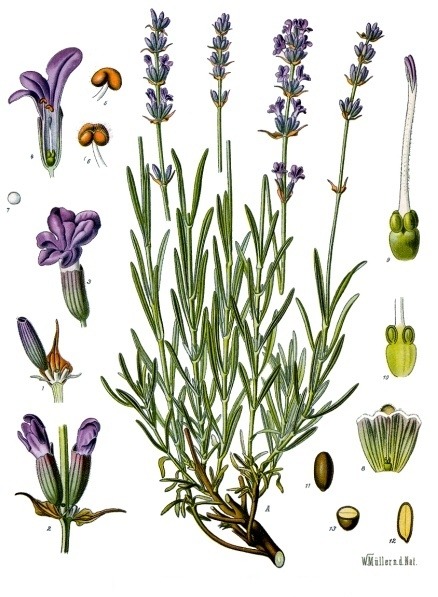
Uses
A very common things are lavender sachets. Now while we may often simply use it to sniff it (which is totally valid use as well btw, especially if you kind of squeeze it during anxiety), it has other uses too. When kept between laundry (into wardrobe, or even some places you store seasonal clothing), it can both give it the wonderful scent and also deter insects. You can also toss them into the dryer together with your laundry (Tutorial)! And since it is famous for helping with relaxation and sleep, you can always keep it near / under your pillow to help you with that.
Another popular use is in essential oils. It brings all the benefits mentioned above. For the smell, you can dab them on your skin and sniff that, or diffuse them in an aroma lamp. In the history section, I’ve mentioned soldiers carried it with them to treat wounds. It was proven to help wounds heal and can still be used that way today. For topical use, ALWAYS USE DILATED OILS ONLY. You can check out the guide to diluting essential oils on aromaweb.
A common use for herbs is tea. Lavender tea brings all the benefits we talked about - it is relaxing and healing. Only the buds are used for making the tea, not the leaves. You can of course also mix herbs - some other popular choices are chamomile, which is also enhancing the relaxation and sleep of lavender, and mint, which can help with some digestive problems, but also just tastes good with it. Senchateabar.com has all these three recipes (as to how long you should brew them).
Another common use is culinary. So integrating lavender into all kinds of food recipes. Now, while most lavender is safe to eat, there are some that simply shouldn’t be, like Levandula Stoechas, Levandula Latifolia and Lavandin, but others will just make your food taste soapy and overly floral. What’s used in recipes is culinary lavender, which is usually cultivated from English lavender and has less oil than aromatic lavender. Awesomeon20.com has some wonderful recipes with lavender and I actually quite like this site for kitchen magick, because they talk about magickal properties of the ingredients used and also have posts about which recipes are good for holidays of the Wheel of the Year for example.
And finally, we can of course use lavender in spells. We use it for spells that need the properties of relaxation, sleep, healing, or love. Also protection or just for general “witchy” things (like enhancing intuition, etc.). This can include spell jars, burning the herbs, sprinkling some lavender infused water, making circles with them, or so many other things. Some spell recipes:
anxiety spell jar
sleep spell sachet
self love and healing spell jar
Harvesting and Drying
I won’t be going into how to grow lavender, however I do want to talk about how and when to harvest it and how to dry it. It takes about 3 years for the plant to mature, so while you can absolutely harvest a bit before they mature, leaving them alone helps them grow and develop more.
Now let’s look into when to harvest. For best fragrance and essential oil content, that would be in their early bloom cycle (meaning when the buds are barely starting to bloom - so you have the stem full of buds, and you already see few of them blooming, while the others are still closed). That applies to each individual stem. And also it is often said that you should harvest them in the morning, once dew has dried, because sun dissipates some of the fragrant essential oils.
You really don’t have to follow this strictly though. This is mostly to maximize the fragrance, and also because when the flowers mature and start browning, they tend to fall off the stem more easily. What you probably should follow is to not collect it wet. That means let the morning dew dry, and not collect within 24 hours of rain. That’s because damp environment increases the chance for the flower to rot.
As to how, we can use a small curved knife, which is ideal for cutting lavender, or pruning shears, or scissors. Just try to not use your hands for it, since that usually damages the stem, while sharp tools help it heal quicker. Also usually you want to organize them into bundles after cutting them, so you can wrap a rubber band around your wrist to make this easier.
Now to where exactly to cut. Well, with lavender used for culinary purposes, you should cut above any leaves and side branches, because leaves are not recommended for cooking (mostly for fragrance). Also please make sure your lavender is safe (and good) to eat before using it that way!
If you want longer stems, perhaps for decoration, or with lavender that doesn’t have much space between the flower and first leaves, then just follow the stem lower and cut at another junction. However, keep in mind that you shouldn’t cut more than two-thirds of the plant’s hight, so that it can continue to grow.
And now finally for drying itself. One way is to hang it in bundles in a dry, warm, airy room. Also in the dark, which helps it keep its color. To help the air circulate, you can just use a fan (if it’s some space like a basement or a closet). The bunches should be tied secure enough, so that it doesn’t fall apart, but not too tight. Also one source recommends to not dry them in spaces like garage, where they’d be exposed to engine and chemical fumes. It can take up to 6 weeks for them to dry this way, and you’ll know the stems are dry once they break instead of bending.
Another way is to dry them in food dehydrator. This speeds up the drying process significantly, while keeping the quality of the flowers. For this, remove the stems, leaving only flower buds in tact. Put them on the dehydrator trays so that they don’t touch each other (and use tray liners if you have them and the flowers are falling through, or even parchment paper). Set it to a low temperature - 95°F (or 35°C). It shouldn’t be more than 100 to 105°F (if you don’t have a lower setting). It should take about 24 to 48 hours to dry completely. Again, to find out if it’s dry, just try to snap one of the larger bud bundles in half, and if it bends, then it’s not dry yet.
Another method is to dry them in an oven. This is not ideal, because lowest setting on ovens is about 180°F (80°C), which, as you can notice, is more than the highest setting we could dry it in the food dehydrator. This amount of heat releases the essential oil from the flower buds. That’s why when using it, you should check on it every few minutes. And also leave the door slightly open so that the moisture can escape.
Then there’s microwave. That’s even harder to watch than an oven, so it is likely to produce less fragrant lavender. Or you can press it between heavy books, and leave it a few days to dry. That’s a method we usually use when making our own herbals.
Then you usually remove all the dried buds and either seal them in an airtight glass container. And you’re ready for using it!
Sources
The Modern Witchcraft Guide to Magickal Herbs by Judy Ann Nock
Cunningham’s Encyclopedia of Magical Herbs by Scott Cunningham
newcropsorganics - lavender history, taxonomy and production
wikipedia.org - Lavandula
cachecreeklavender.com - history of lavender
lavenderbackyard - how to use a lavender sachet
ncbi - wound healing potential of lavender oil
bonappetit.com - cooking with lavender
bbfamilyfarm.com - what kind of lavender can you eat
gardeningknowhow.com - Lavender harvest time
homesteadandchill.com - Harvesting Fresh Lavender: How to Harvest, Prune & Dry Lavender Flowers
bhg.com - When and How to Harvest Lavender for the Best Fragrance
littleyellowwheelbarrow.com - How To Dry Lavender (Preserving Methods And Tips)
all pictures in this post are free stock images, you can see their source when you click them

Thank you so much for reading! If you use lavender in any way, I'd be glad to hear about how you used it in the comments. If you'd like, you can head to the library to find more informational posts. And of course I'd be grateful for any likes or reblogs. See you in the next one!
5 notes
·
View notes
Text
Blog Introduction and How to Navigate It
Hello and welcome to my page. This is to serve as a navigation around the page, especially for the web view.
Posts are done either on special occasions (like moon phase celebrations), for reblogs of good posts I find on tumblr, small things I want to share, or - most importantly - announcement posts about additions to the library. Those posts contain the page as well, so that you can read it in the app when you don't want to go to the web view. All the announcement posts however do contain a link to the page in the library.
The following concerns mostly the web view.
I will start with the Library, as that is the main focus of this blog. It is a page acting as a directory to other pages. It is all sorted by topic and you can view it a bit as my wiki. My goal is to collect as much knowledge as I can in here. You can get to the library from the navigation.
If you want to search for something, you can do so from the home page and you should hopefully see an announcement post about such a topic being added to the library.
Next in the navigation are reviews. Those aren't pages, but it will show all the posts with the corresponding tag - so either book, app, or tarot reviews. Those are written by me, as you probably guessed, though I try to look afterwards at others ratings as well, so that I can tell you if my opinion seems to differ from the 'norm', so that I don't just repell you from something you might like.
Library Pages Now, I try to put as much information as I can in my posts, including personal experience and of course the sources. Also, I add a link where you can download the .md file of a grimoire page (which is pretty much notes from that post). It is so that you can import it into logseq or notion, if you keep your digital grimoire there. Or you might just want to check it in notes style, rather than blocks of text.
These pages can of course also update. That happens when I find about about something I haven't heard of when making the post, or somehow remember there should be something added. In that case I will probably make a small announcement post saying what was edited.
Then there's the casual ask me anything. If you want to ask something, there is both anonymous and sign-in variant. If you wish to not have it posted, even anonymously, then you can ask while signed in and write into it that you'd like me to respond in DMs. I haven't tested this out myself, but it should hopefully work.
Thank you for hanging out in my library. As for myself, I might write an intro about me at some point, but it won't be now. It will probably be once I grow my library a bit more.
0 notes
Text
New Moon in Taurus May 2024
Good morning everyone! Today we have the new moon in Taurus, a very practical, secure and down to earth sign. What are y'all's plans?
Here is a tarot spread I found, an absolutely wonderful one:
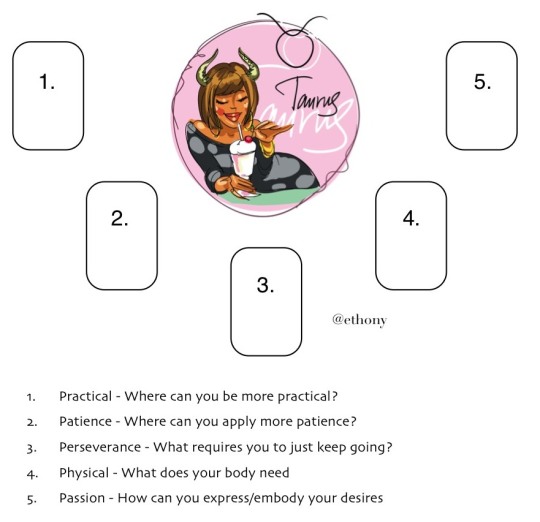
You can probably see the link of the picture itself, but this is also the site it's from: ethony.com which has some more details about the spread and also talks about the Taurus moon energy. Make sure to check them out too!
Lately, I've started a tradition of absolutely no electronics during the day of new moon. I have a notepad where I note plans, any info I need for the day (like bus times, so that I don't need to look at an app) and plans and once I complete them, also notes on what I've been doing, on the reading, etc.
This time however, I'm leaving the day for Friday, because I have an exam tomorrow that I need to study for.
Do let me know what your plans are! Or perhaps you celebrated yesterday? This time it's quite close to midnight, so I'm not surprised if your timezone shifted it to 7th instead of 8th.
Have a wonderful day and I'm looking forwards to the next one!
0 notes
Text
Wheel of the Year 101 - Beltane
The post on website
Hello tumblr! Today is Beltane and I've had this post mostly written for about a week now, just got caught up with other things. Hopefully I'm not too late though!
In this post, you'll find out:
the history of Beltane
when and how to celebrate (with reviving some old traditions!)
links to recipes and playlists (with over 100 songs)
correspondences (foods, herbs, incense, ...)
Click Keep Reading to read the entire post, or you can read it on the blog page Beltane. On the web page you can also find download link for the .md file if you'd like to import it as a grimoire page into notion or logseq!
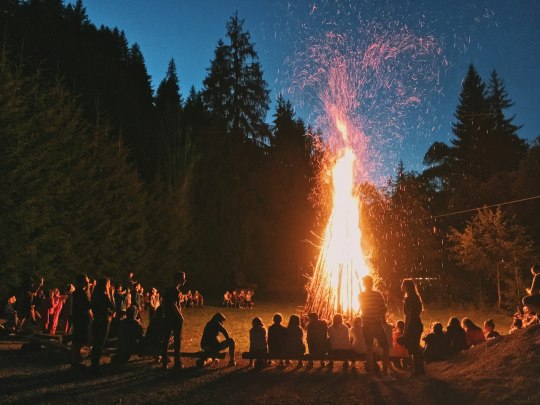
Beltane
History
I will start it off with the following: Beltane is actually Anglicised version. It would be more correct to write it as Bealtaine, which also shows its pronounciation (Bee-awl-tin-a). If you’d rather like to hear the pronounciation, Forvo actually has 4 different voice notes of people from Ireland pronouncing it. I will probably keep using the word Beltane going forwards, but it is useful / interesting to know the etymology as well. It comes from celtic Baal or Bel, meaning “Bright one”. Like Imbolc (which was also called St. Brighid’s day), Beltane also is tied to a celtic deity. This time it is Belenus or Belenos, the god of fire, associated also with sun, healing and prophecy.
In Wiccan traditions this is the time when the Horned God fully matures and mates with the Goddess.
Similarly to Imbolc, Beltane is also the midpoint between an equinox and solstice and is one of the 4 fire festivals. It is the beginning of summer and is usually celebrated on May 1st (although some may choose to rather celebrate on a different day, if that’s what the midpoint between summer solstice and spring equinox falls at).
I’ve seen it connected to fertility again, but that’s mostly because fertility is the undertone of most sabbats, or because that’s what the modern “May day” represents. Notice that the Wiccan celebration of this sabbat actually is about this, perhaps also coming from the later interpretations of Beltane.
It is also seen as the time when the Aos Sí (Fair Folk) interact more with the human realm, and so people make offerings to appease them and did rituals to also protect against them. Other than that, the festival is mainly all about protection. The fire rituals were meant to protect both people and the cattle, that they also moved from one pasture to another during this time (a concept called Transhumance). They were moved to the lower summer pastures. This Transhumance seems to have been actually the core of Beltane.
One beautiful custom was to extinguish all fires in the home before Beltane. During the communal bonfires they walked around and invoked good fortune and protection for the coming year. Once they returned home after the celebrations, they carried back a torch from the communal fire, to relight the hearth.
The month of May is well known for the blooming flowers, and Beltane traditions reflected this as well. Flower garlands were made, and flowers would be seen pretty much anywhere. Most often used one was a yellow flower, for the colour is symbolizing sun and light.
One other custom was to burn bushes, once again because of the fae, who were thought to take refugee there. And one custom that has appeared later on was the crowning of May queen and dancing around the maypole, which I think most of us has seen somewhere, at least on pictures, since this tradition seems to have also grown nearly extinct.
How to Celebrate
As I’ve already mentioned in the history section, Beltane is one of the fire festivals. If it is within your possibilities, you can light a full bonfire! Or maybe a smaller one in a fire pit, where you would normally grill sausages. And of course the variant many of us go with - candles. And if you’d like, you can also bring out the old tradition of extinguishing flames at home (so mostly candles) and then relighting it again with protective intents.
One more tradition I haven’t mentioned - first dew on the morning of May, if applied to the face, would cause beauty. You can certainly do this as soon as you get up in the morning!
Next up is the famous Maypole. While you might not have the chance to participate in it in your town / village community, you can certainly make your own! I’ve seen an amino post by Isa and Björn (the name is down below), in which wrote their wishes on long strips of thin, biodegradable paper and tied them to a young birch tree, while placing a small gemstone at its base as an offering. You can technically also tie strips of paper to some bonsai and then take them off after a while, perhaps burning them. The sky is the limit!
FLOWERS. Pick them, make garlands, make crowns, do anything! If they’re yellow, even better. Maybe it could also be time to look into herbology. Or make yourself some tea from scratch.
Other things:
Protection spell time!
Recognize any fae you work with / know live near you
Wear corresponding colours, decorate your altar, …
Check your wards / shields / other protections
Spotify playlist
YouTube playlist
Beltane tarot spread
Recipes to celebrate Beltane
Correspondences
Incense: rose, primrose, lilac, vanilla, cinnamon Herbs: primrose, hawthorn, rowan, elderflower, marigold, hazel, holly, cowslip, mugwort, daffodil, pretty much any yellow flowers (careful about toxicity!), lily of the valley, daisy, willow, woodruff Decorations: maypole (even tiny ones), flowers (mainly yellow), ribbons, candles Colors: yellow, orange, red, perhaps also green and white Foods: oatmeal, milk, milk products, wine, cherries, bread Stones: bloodstone, quartz, rose quartz, amethyst, onyx, orange calcite, citrine, amber, carnelian Other names: Lá Bealtaine, Latha Bealltainn, Beltain, Beltine, Beltany, May day, 2nd fire festival Other celebrations this time: Rowan Witch Day (Finish), Sacred Thorn Tree Day (Irish), Festival of Shashti (Hindu), Earth Day, Samhain (southern hemisphere) Misc: light, fire, protection, purification, fae, for some also fertility and growth
Sources
Llewellyn’s Sabbat Essentials - Beltane (Rituals, Recipes and Lore for May Day) by Melanie Marquis (2015)
wiccaliving.com - Beltane
mabonhouse.co - history of beltane
thornandclaw.com - beltane
paganpages.org - beltane correspondences
study.com - Belenus mythology, cults & facts
cpre.org.uk - origins of beltane
Bealltainn: Transhumance & The Gaels by Dead on P&W Amino
Mordred’s Guide To: Lá Bealtaine (Beltane) #HolidayCelebrations by Mordred on P&W Amino
Beltane: Overview and how to celebrate by city witch on P&W Amino
Blessed Beltane Happy Beltane and my Rituals this year by t. on P&W Amino
all pictures in this post are from unsplash, free stock images

Thank you so much for reading! I hope you found this useful, or at least interesting. If you'd like, go check out the library for more posts like this! There aren't as many right now, but it will keep filling up. I also reblog witchy posts I find useful, so consider giving a follow! And I'll see you in the next one.
#withcraft#pagan#pagan witch#witchblr#wheel of the year#beltane#spiritualism#witch blog#tarotblr#tarot#kitchen witch#bealtaine
25 notes
·
View notes
Text

> Before we adopted the Latin name for our second month, Old English used much more vibrant names to describe the month now known as February. The most common Old English name was Solmonath, which literally means “mud month.” (https://www.dictionary.com/e/february/)
> A lesser-used term was Kale-monath, which meant “cabbage month.” Perhaps, the medieval English were eating a lot of cabbage in February? Strange. (https://www.dictionary.com/e/february/)
Once February became an official month its name was changed. It was derived from the Roman festival of purification called Februa. In funny fashion the festival also gave birth to the Roman deity Februus. What is also interesting to note is that January and February were added months. Originally the calendar year was only 10 months but in 700BCE they were added by the second king of Rome to make the year match up more with how long it takes the Earth to complete it's rotation around the sun.
𝔽𝕖𝕓𝕣𝕦𝕒𝕣𝕪 ℂ𝕠𝕣𝕣𝕖𝕤𝕡𝕠𝕟𝕕𝕖𝕟𝕔𝕖𝕤
⚘ Animals: otter, unicorn, dragon, groundhog, deer, sheep, hares, rabbits
⚘ Birds: eagle, chicadee, robin
⚘ Celebrations: Imbolc (Feb 2), Candlemas (Feb 2), Disablot (Feb 2), Februa (Feb 15), Valisblot (Feb 9), Lupercalia (Feb 15), Parentalia (Feb 13-21), Quirinalia (Feb 17), Equirria (Feb 27), Fornicalia (Feb 17)
⚘ Colors: light blue, violet, pale green, black, red, pink
⚘ Deities: Alhrodite, Juno, Mars, Brighid, Kuan Yin, Diana, Demeter, Persephone, Sjofn, Apollo, Boann, Chang-O, Parvati, Venus, Shakti, Bast, Selene, Hebe, Eros, Pan, Branwen
⚘ Element: air, water
⚘ Flowers: balm of Gilead, hyssop, myrrh, sage, spikenard, primrose, viola, snowdrop
⚘ Gender: neutral
⚘ Herbs: cypress, cinnamon, lavender, patchouli, lemon, orange, sandalwood, rose, jasmine, ginger, clove, frankincense, ylang ylang, palma rosa, bay, mint, nettles, rosemary, thyme, oregano, balm of Gilead, hyssop, myrrh, sage and basil.
⚘ Magick Areas: purification, growth, healing, energy, self-love, accepting responsibility, self-forgiveness, making future plans, astral realm, banishing, beginning, empowerment, fertility
⚘ Moons: Snow Moon (Dakota), Racoon Moon (Dakota), Eagle Moon (Cree), Bear Moon (Ojibwe), Black Bear Moon (Tlingit), Groundhog Moon (Algonquin), Goose Moon (Haida), Bony Moon (Cherokee), Hungry Moon (Cherokee)
⚘ Sabbat: Imbolc (Feb 1-2)
⚘ Scents: wisteria, heliotrope
⚘ Spirits: house faeries (home and house plants)
⚘ Stones: amethyst, ammolite, angelite, garnet, jasper, imperial topaz, onyx, aquamarine, fluorite, turquoise, ruby, bloodstone, moonstone, obsidian, pearl and quartz
⚘ Trees: rowan, myrtle, laurel, cedar, cypress
⚘ Zodiac: Aquarius, Pisces
9 notes
·
View notes
Text
Wheel of the Year 101 - Imbolc
The post on website
Hello tumblr! Since we're in the Imbolc season, I've decided it's the best time to make a post on it. And it can also be my way of celebrating.
In this post, you'll find out:
the history of Imbolc
when and how to celebrate (MANY examples)
links to all kinds of tutorials (like Brigid's cross, recipes, crochetting, playlists and a tarot spread)
correspondences (colours, foods, topics, ...)
Click Keep Reading to read the entire post, or you can read it on the blog page Imbolc.
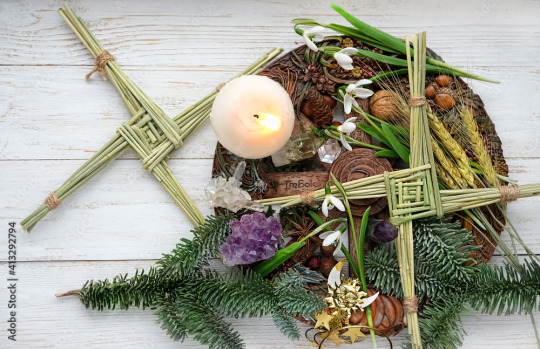
Imbolc
History
Imbolc (which is pronounced ee-molc btw), sometimes also called Brigid’s Day, is rooted in Gaelic history and is mostly about the Celtic goddess Brigid, goddess of learning, healing and fertility. She, as hearth goddess, is associated with cooking and family life. Traditionally, it marks the first showings of spring. However, as we often orientate ourselves around a calendar rather than how nature changes, it is usually celebrated on February 1st, as a midpoint between winter solstice and spring equinox. Some people do like to celebrate it closer to February 5th or on the second full moon since winter solstice though. And some celebrate on January 31st. Technically speaking, the celebrations were often stretched across multiple days around the actual date, so don’t worry if you don’t get it exactly right.
Marking the start of spring, it mostly was the start of agricultural season. The early celebrations were focused on welcoming the growing light, cleansing and purifying (take the spring cleaning for example) and fertility (milk is a common association, as the birth of lambs and other livestock was also happening through this season and was also important for agriculture).
In Wiccan traditions, Imbolc is when the God is developing and the Goddess is recovering from giving birth to him at Yule.
How to Celebrate
A well known symbol of Imbolc is Brighid’s cross. Typically it has 4 arms with a woven center, but there are other versions too (like a 3 armed version). It is made of rushes or wheat stalks. Kind of like Yule log, it is meant to be kept around the whole year - leave them where you want, often it is hanged above fireplace. It’s supposed to protect the residents from illness, hunger and fire. Each year you’re supposed to make a new cross. I couldn’t find any sources that would talk about how to deal with the cross from previous Imbolc once you make a new one, but considering Yule log is meant to be burnt, I would say this one is likely meant to be burnt as well, or burried. You can see it as a talisman collecting the negative energy so that it doesn’t get to you, and then burrying / burning the negative energy. And here are some tutorials on how to make it: Written Tutorial Video Tutorial 3-legged cross video tutorial
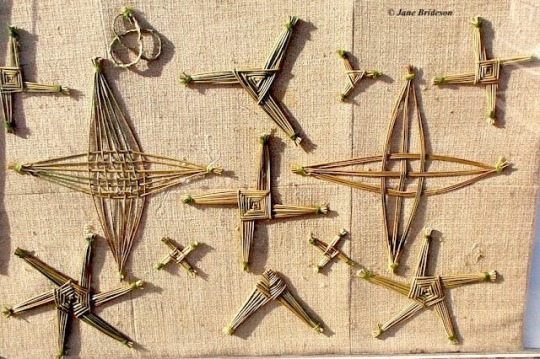
As I’ve already mentioned, Imbolc is closely associated with cleaning. This can be both physical cleaning and spiritual cleansing, often you can combine the two (like by visualising while cleaning that the dust / dirt is negative energy).
Since it is the beginning of spring, another good activity is planting seeds. And this can be done both literally and symbolically. We often plant seeds for something we want to improve, or a project we want to start. Then we take care of the plant and our goals grow with it. This can be also done just in visualisation, or by writing our goals / wishes on a piece of paper and burning it.
Part of this festival is lighting candles to celebrate the growing light. Make sure to let air in too though, we don’t want the candles burning away all our oxygen. And as for all holidays, you can set up a seperate altar, or just decorate your usual altar with things from Imbolc correspondences. The correspondences can be honoured in many ways - like by cooking (with) them, wearing the colours, etc. And some other unusual things to celebrate can be making a playlist for this season, crochetting, etc. You can get creative.
And another thing can be taking a walk in nature and looking for signs of spring, like some flowers poking out, or trees starting to get their leaves again. Though, it can be hard to do in some colder regions, and even in other ones when the weather is changing, as if winter starts later than it used to.
And as it is the Brighid’s Day, the goddess of hearth and family, you can also have lots of family time! Watch some movie under a warm blanket, gather at a fireplace, in the kitchen, cook together… The options are limitless.
Other things:
Cleansing simmer pot
Sunflower crochet tutorial
Flower bookmark crochet
Spotify playlist
Youtube playlist
Imbolc tarot spread
recipes
Imbolc ritual cake
Recipes to celebrate Imbolc
Bannock
Baked custard
Honey butter
Honey cookies
Correspondences
Incense: rosemary, frankincense, myrrh, cinnamon, peppermint, basil, jasmin, wisteria, apricot Herbs: angelica, basil, myrrh, willow, yellow flowers, bay Decorations: corn dolly, besom, candles, Brighid’s cross Colors: white, orange, red, green, brown, pale yellow Foods: dried fruits, grains, bread, cheese (any milkproducts really), nuts, eggs, seeds (like sunflower seeds), spicy foods, honey Stones: ruby, onyx, turquoise, garnet, bloodstone, amethyst Other names: Imbolg (Gaelic), Oimelc (Saxon), Brighid’s Day Other celebrations: Candlemas (Christian), Lupercalia (Roman), Feast of Nut (Egyptian), Groundhog Day (numerous places in Europe and America) Misc: beginnings, change, fertility, seeds, cleaning, cleansing, family, inspiration, creativity
Sources
Llewellyn’s Sabbat Essentials - Imbolc (Rituals, Recipes and Lore for Brigid’s Day) by Carl F. Neal (2015)
wiccaliving.com - imbolc
mabonhouse.co - history of imbolc
thornandclaw.com - imbolc
paganpages.org - imbolc correspondences
Imbolc by Willow Martine on P&W amino
Imbolc by Damilein on P&W amino

Thank you for reading! Consider hopping into the blog and into Library. This is only the second post, but it'll keep filling up. I'm also reblogging useful witchy or pagan info, so if you're interested, do follow 💜
#withcraft#pagan#pagan witch#witchblr#wheel of the year#imbolc#spiritualism#witch blog#tarotblr#tarot#kitchen witch
8 notes
·
View notes
Text
Full and New Moons of 2024 + beautiful moon calendar
Hello tumblr, in this short post we'll look at what moon phases await us this year! Let me start with these beautiful moon calendars from Dreamy Moons. I'm sending them here as even though they are for free, you do need to input your credit card if you wanna download them and I know not everyone is comfortable with that.
These are for northern hemisphere, the site has also the option to choose southern hemisphere. The phases are the same, it's just the style option, because in northern hemisphere the moon looks like this 🌒 and in southern like this 🌘 (the opposite site is illuminated).
Still, check out the site, they mostly sell wonderful journals and art cards, and they even have their own oracle deck and tarot deck! Anyways, here it is:

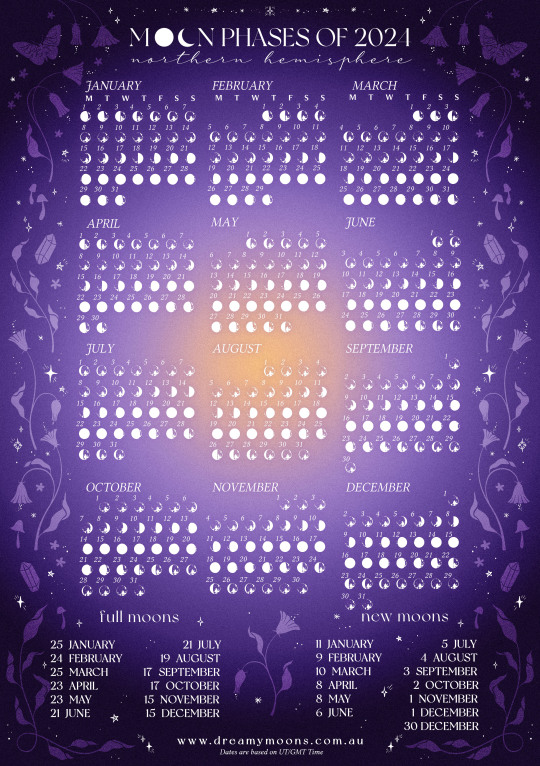
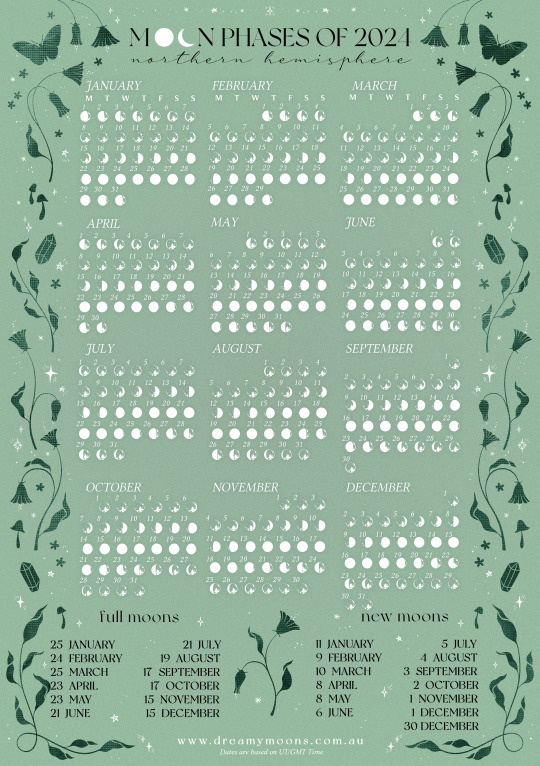
And now for the signs in which each of the moons are:
Full Moons
January 25 (wolf moon) - Leo
February 24 (snow moon) - Virgo
March 25 (worm moon) - Libra This full moon will be fully illuminated, being in a position that let's the sun illuminate it more than ever.
April 23 (pink moon) - Scorpio
May 23 (flower moon) - Sagittarius
June 21 (strawberry moon) - Capricorn
July 21 (buck moon) - Capricorn
August 19 (sturgeon moon) - Aquarius This is also a supermoon and a seasonal blue moon (third full moon in astronomical season that has 4 full moons)
September 17 (harvest moon) - Pisces Another supermoon! And it will also be fully illuminated.
October 17 (hunter's moon) - Aries This is another supermoon!
November 15 (beaver moon) - Taurus And one more supermoon!
December 15 (cold moon) - Gemini
New Moons
January 11 - Capricorn
February 9 - Aquarius
March 10 - Pisces
April 8 - Aries
May 8 - Taurus
June 6 - Gemini
July 5 - Cancer
August 4 - Leo
September 3 - Virgo
October 2 - Libra
November 1 - Scorpio
December 1 - Sagittarius
Black moon: December 30 - Capricorn black moon is the second new moon in a single month!
Other Moon Events
March 25 - penumbral lunar eclipse not as dramatic as other lunar eclipses, often mistaken for full moon
September 18 - partial lunar eclipse
6 notes
·
View notes
Text
Fun witchy things to spice up your school/uni/college year
School/uni starts in late Jan/late Feb here in Australia so leave me alone if you're already in the middle of your school year lol /hl. These are just a few things I did when I was in HS and intend to do now that I'm going to university next year.
Enchant your water bottle with cleansing/purifying energy. The water will cleanse your energy this way. I do this to help me chill the fuck out. I do not do well with academics and the last thing I need is to pick up other people's stress.
Draw sigils for academic success in the back of your notebooks and planners.
Try binding your hair or veiling this school year! It doesn't have to be for religious reasons, it can just be to protect your energy.
Colour code your books or folders to what you need from each subject and set the intention accordingly! For example, red for math because you need confidence and strength or green for science because you need some extra luck in that subject.
Do you remember the erasers with yes and no written on them? Yeah! Make one of those and flip it for on the fly divination! It actually works if you put enough intention into it and it's a fun way to pass time.
Use colour magick in your outfits and shoes/shoe laces! This is a lot of effort so I've rarely do it but I've heard a lot of good things from people who regularly do. Just be careful that you don't accidentally send a nasty lace code message with your docks (or other boots) and shoe laces.
More colour magick but get coloured pens that correspond with your wanted intention! The ink could be coloured or just the outside, it's up to you.
If you pack your own lunch try your hand at some kitchen magick this year! Deli meats, bread, butter, pasta, tofu, etc all have their own uses and meanings. You can do some amazing stuff with food! I really recommend you try it at least once :)
Set your computer's folders names to affirmations or intentions! "I have incredible grades" "I respect my physical and mental needs" "I have the perfect work/school/life balance" are all examples.
This is less about school/uni/college but enchant any jewellery you wear with protection or dedicate it to a deity!
Again, not super school related but do a glamour spell with your skin care and/or make up. It just puts me in a good mood and sets the tone for the day.
I hope you enjoyed! As always, suggestions and tips are more than welcome :)
807 notes
·
View notes
Text

There is this misguided idea that everything a witch uses for their craft must be based on something old or ancient. This can lead to the spread of misinformation about where many of these spells, rituals, and practices actually come from.
Many of our practices are actually fairly modern, and that is ok! Our practices don't have to be from ancient times in order for them to mean something. I think we need to learn where our practices come from and be more honest about their age.
Modern witchcraft practices are a good thing! We grow and change, and so should our practices. There is nothing wrong with mixing some old in with the new. We should be careful when claiming something is from the ancient druids if we aren't certain that it actually is.
255 notes
·
View notes
Text
January 25th is the first full moon after Yule and the New Year. According to The Old Farmer’s Almanac, the names for full moons come from a number of places, including Native American groups, colonial Americans or other traditional North American names passed down through generations. This moon is typically known as the Wolf Moon, believed to be derived from Celtic and Old English origins. So, why the Wolf Moon, mainly due to the fact that wolves tend to howl more often in the winter months.
Other Names for the Full Moon in January:
• Center Moon (Assiniboine)
• Cold Moon (Cree)
• Frost Exploding Moon (Cree)
• Great Moon (Cree)
• Freeze Up Moon (Algonquin)
• Severe Moon (Dakota)
• Hard Moon (Dakota)
• Canada Goose Moon (Tlingit)
• Greeting Moon (Western Abenaki)
• Spirit Moon (Ojibwe)
This year the Wolf Moon occurs in the sign of Leo. It is a powerful time to embrace your passions and let go of people or things you are not in tune with. During this full moon you should be able to find the areas within your life that need you focus, maybe take the time to do a tarot spread to ask what areas are lacking the attention they need. When doing the spread focus on the meanings that reach to your heart and not your mind, Leo energy often focuses on truths of the heart.
You may feel strong emotions pulling you in one direction, do not over think. Allow your emotions to guide you during this time, it may be a leap of faith but it is one that is needed. This road you travel may feel messy or illogical but hold strong and know that through chaos comes clarity. Leo teaches us to show up for ourselves with courage and strength. It reminds us that we can face anything within ourselves, not just the good, with love and compassion.
Take sometime to meditate over the next three days with a focus on listening to your heart, try to block out the mind during these moments (which can be difficult). Find a candle or incense that brings your heart joy. Listen to a soft song that calls to your heart. Set your intention out loud by saying something along the lines of "I block the thoughts that flow from my mind and allow the feelings to flow from my heart that I often push aside". Repeating this allows you a focal point to put your energy into during your meditation. Once the session is complete write EVERYTHING you felt down. Then over the next few days decipher why it was you felt these things.
Another action you can take during this full moon is bathing ritual to aide in self-love. Leo is perfect to bring out unconditional self-love. Take time to look at yourself in the mirror, do NOT focus on the things you see as negatives but say aloud each thing you find to be amazing about yourself, whether physical or mental. Then set up a shower or bath with some candles, a mesh bag of herbs that correlate to self-love (rose buds/petals, apple, lemon balm, marjoram, mint, etc), some soft meditatice music and allow the water to wash away the faults that you see in yourself. When you step out of the shower or bath be renewed and know that you are capable of so much more than what your mind allows you to believe.
21 notes
·
View notes
Text
Pendulum 101
Post
Hey everyone, so we have a new (and first) post on our website about dowsing pendulums!
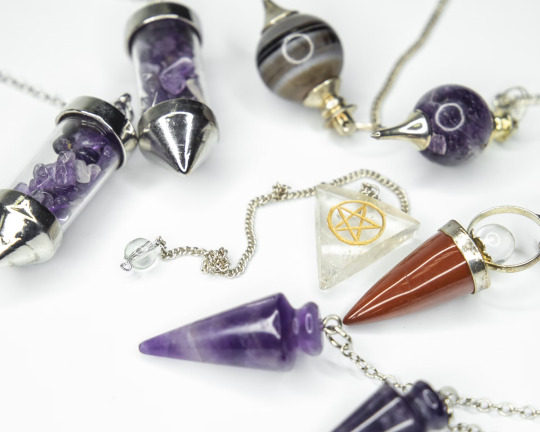
In this post you'll learn:
how to use a pendulum (for divination, finding lost items, blockages, using charts and the 4 basic answers it gives)
pendulum care (cleansing, bonding and why not leave it lying around)
materials properties (common crystals used for pendulums and metals and wood)
how to make a pendulum (general tip for alternative pendulum choices)
If you're interested, it's better to visit the web page, as there it is way easier to orientate yourself in. However if you do wanna stay on the site, you can read it further in this post. And if you're looking for spiritual and witchy content, stop by from time to time 💜 On the webpage there is a Library that will soon fill up, and it'll be easier to find things there in form of web pages rather than tumblr posts.
The link: Pendulum
How to Use a Pendulum
This really depends on your beliefs. Some believe pendulum move on its own, or that a certain spirit is moving it. Others on the other hand believe that it is our own intuition that moves it - so that we are moving it through subtle moves of the fingers. Depending on where your beliefs lie, you may choose to either hold the end of the string/chain in between your index finger and thumb with your elbow on a solid surface, or hang it on something to make sure you’re not the one moving it.
If you would like to rather hang it, there are sites that sell stands for it, or some people like to DIY a pendulum jar/bottle - for that you basically grab a transparent jar and glue the pendulum chain to the middle of the lid, so that when you close it, the pendulum hangs freely in the middle of it. This ensures that no wind will tamper with it.
Some tech witches would probably also use some sort of an app or a website which randomly decides what the pendulum answers. Once again, this depends entirely on your beliefs, whether you believe in the accuracy of divination tools in electronics. Unfortunately I haven’t found a good website or an app that would simulate it well, but perhaps you’ll have better luck!
Now, when you first get a pendulum, other than cleansing it, you can also “calibrate” it. Either you can decide on how it should show each answer, or you can ask it to show you each. You can also ask it basic questions that you know the answer to to find out their meanings (and many people do that even after “calibrating” to check if everything fits). There are 4 basic moves of a pendulum:
Yes - usually either from front to back (like nodding your head), or side to side. As I mentioned before, you can also ask it to show you (“show me a yes”) and remember it or write it down somewhere.
No - once again, usually side to side (like shaking your head) or front to back.
Maybe - usually either clockwise or counter-clockwise. This often means that the answer to your question depends on different factors. Kind of like saying “yes if X, no if Y”. Sometimes certain spirits also like to say “maybe” a lot, in my experience it is a common thing amongst tricksters.
Don’t know / Can’t answer / Rephrase - once again, usually clockwise or counter-clockwise. Some pendulums actually merge “maybe” and “don’t know”. This means that either they do not want to tell you, or you asked a non-yes/no-question.
Another thing are charts - you can use a pendulum chart or board for questions that don’t have yes/no answers. And many also use a pendulum board that has the basic 4 motions on it as well! Super useful for forgetful people. There are many you can choose from, and you can also make your own. There are ones with a full on alphabet, so that it can give you custom answers. You can find many for example on Pinterest. It’s better to print them out, but there were many times I’ve simply opened one on my phone and held my pendulum over the screen.
Pendulum’s are also often used in energy works as a way to find some blockages, which areas need the most attention, etc. Basically in these things one person lies down flat on the stomach or back, and the other person holds the pendulum over their body, asking to point towards the areas. I believe that it is quite a common practice when you go to some reiki therapy.
There are also other ways of using your pendulum. It can be used to find a location that meets your specifications / where the object you’re looking for is located. That could be for example when you’ve lost something in your house, or when you want to look for an ingredient.
For finding something local, you usually ask yes/no questions for each of the rooms (if it’s inside a house, this step would be skipped if you already know the room or if you’re in a larger area). Alternatively, you could hold your pendulum over a sketch of the layout of the building to figure out the room. Then, you would ask for the direction and the pendulum will point towards the object. Make sure you’re standing in the doorway, because otherwise you might be going forwards when the pendulum was actually pointing behind you. You do this multiple times, also throwing in some questions like “am I near the object”, etc.
For finding something in a large area (like entire neighbourhood, or tips for trips to other states, finding ingredients, etc.) you can use your pendulum with a map. Then you ask it to point to the area where you will find it / that’s good for your vacation. You can once again do it multiple times, and if you’re going to search for something specific, you can then use the local way of finding things.
One more thing I’d like to talk about before moving on to taking care of a pendulum, is divination itself. When talking about divination, most people probably imagine fortune telling. Now I’m not saying that’s impossible, but the fact is, future is everchanging. The slightest of things can change it - that is why the further we’re reading, the more inaccurate it gets. When you do a reading (and I mean anything, be it pendulum or tarot) for today, it will be likely quite accurate, but the further away you do, it gets less and less accurate. And on top of that, we can often misinterpret things. So just keep this in mind when using your divination tools. I personally rather do readings for advice rather than fortune-telling.
Pendulum care
When we talk about pendulum care, it’s mostly about cleansing. Why do we cleanse? Because most things collect some amount of negative energy through time. This is especially true for spiritual tools, including divination tools, because by doing spiritual things, we open the area (and ourselves) to the energies of the universe - which includes negative ones. Other than that we also always cleanse tools when we first obtain them, to rid them of any energy they were subjected to up till they got into our hands. This ensures they keep giving accurate answers and we don’t bring even more negative energy into our lives.
Another thing is bonding with your pendulum. Using it by itself of course also is a way of bonding, but there are other ways too. Bonding helps you be more in tune with its energy, makes your readings more accurate. And if you (like some other people) believe that each divination tool has its kind of spirit (I feel like this is really common among card readers, because those cards be acting sassy), you might want to bond for the sake of bonding. Now this is done through for example carrying it around with you and meditating with it. When you first get it, asking test questions (ones you already know the answer to) can be a good way to feel its energy as well. Just make sure it’s alright with test questions, some divination tools really don’t like those in my experience, at least when you’re acting distrustful.
Cleansing your pendulum can be done in multiple ways. If you’d like to use physical cleaning (with water) while focusing on cleansing it spiritually too, please make sure that whatever the material is can be washed. There are many crystals that react with water, and in some cases it can be harmful not only to the crystal, but also to you.
Another way you can cleanse is by sunlight or moonlight. I’ve seen multiple opinions on these - some say that some crystals would be better with sunlight while others with moonlight and that full moon is the best, because the moonlight is strongest. However I have found it more common for new moon to be a cleansing period. The energies of new moon leave behind what should be gotten rid of and starts with a clean slate. Charging crystals would be probably better in full moon though, yes. But crystals currently aren’t our topic. You also need to make sure how certain crystals react with sunlight - because some fade if left too long in it. It doesn’t damage them, but you might be disappointed if your beautiful amethyst pendulum suddenly starts losing its purple colour.
There is also something called soundcleansing. Usually it’s done with tuning fork or a singing bowl, but that doesn’t always have to be the case. I often combine this with visualisation and clap my hands, hum, things like that. It is mostly believed that the vibrations are what cleanse. So you can also pull up youtube video with some sounds and it should work just fine.
And then there is visualisation and meditation.This one is even more flexible than the other methods. You sit down with your pendulum and meditate, then imagine perhaps the energies exchanging, getting rid of any dark spots (negative energy) and bringing in some positive energy (often either white or yellow). I often combine this with some movement like slamming one hand lightly against the other, like shaking the negative energy out, like a powder.
Materials
And I’d also like to mention that it is good to put up some protections around the place you wanna keep it in (you can also make a protection for the sachet you keep it in. This keeps it from building up too much negative energy. Many people believe that if a crystal builds up way too much negative energy, they can break. As in, part of them can fully chip off. This is actually what happened to my pendulum unfortunately, as I did not keep it in a protected place. You can continue using it even after that, I still do, but it’s never a good thing nor a good feeling to have that happen.
Other than protecting your pendulum, don’t forget to protect yourself too! Since you’re opening yourself to the universe, it is important to protect yourself from anything harmful that could enter your place through it.
Pendulums can be made from all kinds of things. If you don’t have the budget to get one, you may even use a necklace, or literally any weight hung on a string. But of course, crystals are the most common for pendulums.
Rose quartz - Other than being the love crystal as everyone knows it, rose quartz is pretty good for getting rid of negative energies. So might be doing exceptionally well in love readings, but is mostly used for it’s protective energy.
Black obsidian - another crystal known mainly for its protective and cleansing energies, maybe more than rose quartz, which is usually focused more on love, self-love.
Lapis lazuli - its properties have wisdom and truth. It’s not surprising that it is used for pendulums a lot. We do after all ask it for answers.
Aquamarine - quite an interesting stone. The connection with water means it has some cleansing properties. Spiritually however it is also connected with trust and communication. Once again, not surprising why one would want it for a pendulum.
Amethyst - Ah yes, amethyst. It has been considered one of the main spiritual crystals. Not too surprising, it is connected to the third eye energy center. It has the properties of wisdom, intuition and fighting anxiety and depression. In my opinion it is likely one of the most common materials used for pendulums and other spiritual tools.
Of course, crystals aren’t the only material used for pendulums. Another common one is metal. Copper for example is a great energy conductor and is quite widely used. Brass and Bronzestem from copper and therefore have very similar properties and are quite sturdy.
Sometimes also wood is used, as it is more grounding and stable, unaffected by the surrounding energies, only by yours as you hold it.
Some pendulums have beads / small crystals on the string. It can be used to customize the look, but also to add some meanings if you’d like. Quite common are also energy center beads (sold under “chakra” term, as chakras have been greatly appropriated from Hinduism and Buddhism).
Making a Pendulum
There are multiple ways you can make your own pendulum if you don’t have the funds or don’t find it worth investing money into. You can always grab a necklace that you perhaps own. While most rather own pointy pendulums, they don’t have to have that shape. It is always good for it to be balanced though.
And if you’re into some woodwork, you can also carve out a wooden pendulum, hang it on a string and there you go! It shouldn’t be too heavy though, otherwise it will have a hard time swinging. And being too light might lead to it being swayed by the faintest of breezes.
Final Note
That’s all for this post. If you have any questions or anything you think I should add to this post, go to Ask Anything. You can also write in that you do not wish to have it published, however, then you need to not write anonymously, otherwise I won’t be able to respond in DMs. For more posts, check out the Library. Have a wonderful day 💜
Sources
My Experience
trulyexperiences crystal correspondences
opulentcharms pendulum materials

Disclaimer: all pictures are from royalty-free websites
#pendulum dowsing#occult#spirituality#witch#withcraft#divination#pendulum readings#pendulum board#crystals#witches#magick#witchblr#spiritualism#fortune telling#occulltism
47 notes
·
View notes